![]()
The Words of the Tamayo Family
|
|
The Words of the Tamayo Family |
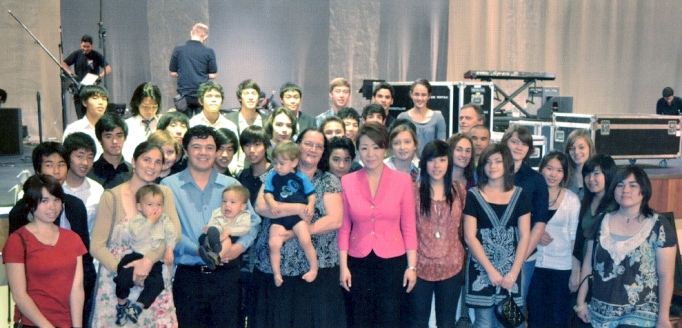
Blessed
Teens Academy staff and students greeting In Jin nim at Lovin' Life
in Las Vegas last May; BTA director Jeri Tamayo is next to In jin
nim, holding her grandson. Michael Hentrich and his wife are next to
Jeri, holding their children.
The Blessed Teens Academy was established as an alternative to the public school environment for Blessed Children. As Unificationists, we teach our children to love and to live for the sake of others. They grow up with these concepts and ideas, yet they are still fighting with a humanistic, self-centered environment, which has had a big influence on them. The Blessed Teens Academy tries to create an environment that encourages a strong parentñ child relationship, where children are able to be open and honest with their parents. Here, they can learn more about their faith, how to apply it and to become confident in it. Unificationist children do have a fundamental standard inside them, because we have raised them centered on True Parents tradition and the Divine Principle. As parents, we try to prepare our children well, but honestly we are not always aware enough about the negative effect the environment is having on our children. By the time we do realize what's happening, some of our children may already have had some serious negative influences. Even though we as parents strive to instill within our children our True Parents' traditions and spirit, we are still fighting an uphill battle against the fallen culture of the world. Our children are immersed in this culture.
Father has taught us the value of a different culture centered on vertical alignment; that is, the parent-child relationship. When we are able to understand that concept and embody it in our hearts, that's actually when we begin to grow, when we begin to develop healthy relationships. It's in that vertical relationship between a parent and child and an older and a younger person that we learn to truly love and care for each other. This is why we use vertical alignment as the root of our fundamental internal education. From that root, students are taught the value of attendance, the value of True Parents and True Children, the relationship they have with their parents and Abel figures, the foundations of faith and substance, how to make good conditions, how to overcome the four fallen natures, and how to relate with one another from a heavenly point of view.
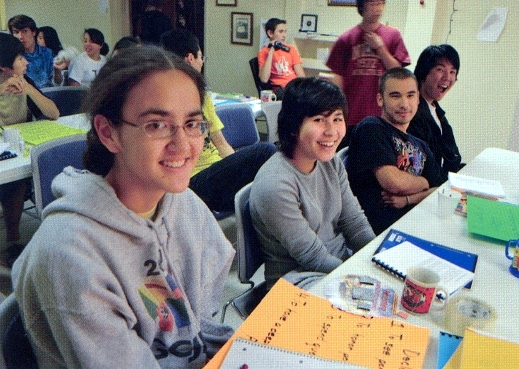
Big
smiles at a Blessed Teens Academy internal workshop
I came to the BTA when I was thirteen; I am now fifteen. I had a bit of a hard time in middle school. I found it hard to respect my teachers and also my parents, because I thought my friends knew better than they did. My parents thought I would not do well in a public high school environment, and I actually felt the same. I was depressed. I didn't like the way things were going. I wanted something different, even though I didn't know what that was. I wanted to check BTA out, in pursuit of trying to find something better in my life.
I arrived, and I began to hear many things that I had heard my whole life, but in a new way -- through my peers in the second generation. Not just from my teachers, not just from my parents, not just from my camp leaders, but from people of my own generation that had gone through experiences similar to mine. They shared how they got through these issues. They expressed the concepts of Divine Principle in a new way, and because I was looking for something, I wanted to hear what they had to say. I wasn't here just to have fun, I wanted something more. So hearing it from my peers was really beneficial for me. I felt so much more inspired because I was hearing it from those who had gone through the same things I had. They had broken through, were now in a way better place than before and were advising me.
At first I was still very, very lazy and it was not easy... you know, very basic things like serving others, respecting my elders, loving my teachers, etc. I started with simple things, getting a glass of water or a plate of dinner for others, visiting them and massaging their feet, asking how their day was going. With these simple things, I began to develop the heart to attend, to offer some- thing to them, not thinking of myself as I usually did, but thinking about others for once, looking at things from their point of view.
That was how my first year went. It was really hard to all of sudden have a lot of respect for the elders. I was trying to find out who I was and how I wanted to develop my character. Everyone else was trying to do the same. I was now in an environment where I had room to grow without being judged, where I could learn about my faith. I could just open myself up to the brothers and sisters and the teachers because that's what they were there for. I really appreciated that.
In my second year, things became more substantial. I would read Father's speeches in the prayer room, try to understand them, and then put what he said into practice during the day. Even though I often felt it was too hard or I was too lazy, I just decided to put it into practice, even if a little bit.
By the third year -- this year -- I had an opportunity to share with other people, to be an example for other people, and it allowed me to have to check myself every second of the day. Now I'm not just somebody who is listening. I'm now somebody who is teaching the younger ones, the newer students. And this was really a great experience because I had so many struggles. I would ask myself, Wait, why am I in a position to teach somebody? I don't even know who I am, so why do I have to teach other people?
It was hard. Also, because I have a very arrogant nature, everything I said seemed to come out as, You have to do this and you have to do that, but I don't have to do anything.
Kind of like that. That's how I felt I was coming across to others. It was hard for me to humble myself, to be in an Abel position but also to be in a Cain position, humbly. It was hard not to think that if I say these words maybe they will accept me, but instead to think that maybe I could help them.
The first year was very hard because I was just beginning, but as time progressed more and more my parents really felt my change of heart; they began to trust me more. I had faith in what they said and had more of a child-like heart again -- uniting with what they said no matter what, whether I liked it or not, whether I thought they were wrong or not; just having that heart of being there for them and caring for them; letting my mom sit down and have a glass of milk while watching a movie, as I go do the dishes.
It was a beginning for me to have a totally different mind-set, where I could see that what I was doing before was wrong and now what I'm striving to do is correct -- the life-style, reading Father's speeches, and so forth. Still, there are lots and lots and lots to learn. It doesn't mean I have the right to stop learning it, but I feel as though I have a foundation. I can go home now and not be swayed by things that I was seduced by before, like wanting to have girlfriends and doing stupid things and not caring about how my parents feel, but instead having the motivation to be better, and not just for myself, but for God and True Parents.
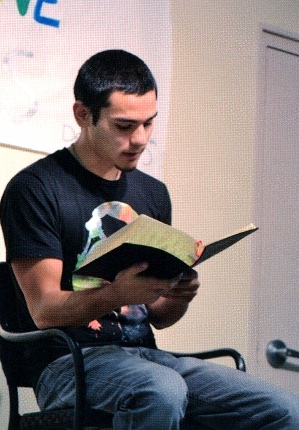
Neil
Rischl shares internal guidance with the younger students
I came last year; I was fifteen years old. It was the worst stage of my life.
I had rebelled a lot. My parents were always working late. I would go to school in the morning, so I would not see them until late at night. Often it was difficult for me to feel connected to my family because of that, so I would do my own thing and most of the time I would go to friends' homes.
If I had a question, my mother would always just say, Read the Divine Principle. She wouldn't explain anything; that was her answer for everything. It was very hard for me to accept and understand that. There were many misconceptions. It didn't help that my parents were Japanese and I was growing up in America, a culture which was foreign to them.
Most of my high school life was quite challenging. Before I met the Blessed Teens Academy, I felt as if I had hit rock bottom. By the time I came to BTA, I was open to receive anything.
When I came to BTA, I discovered I had to live a public life with a bunch of brothers and sisters, and I had parental figures that I had to learn to respect and create relationships with. Having to be around many brothers and sisters was hard to accept, because I am the only child in my family. Learning to communicate with the mother figures of the house helped me to open myself to my mom and talk to her from a whole new perspective.
Especially coming from a Japanese family I noticed how Americans and Europeans are kissy and buggy; but my family was never like that. As Japanese, we don't really express ourselves through hugging and kissing. No if I express myself to my mom, even if I am crying, she receives it and responds how I imagine True Mother would respond; she says something simple but profound. It's amazing.
If I had to choose one thing that I learned in BTA above the rest, it would be the value of my relationship with my parents. There is still a lot to work on, but now I have a deeper relationship with my parents.
During a BTA workshop I met some BTA students. They were strong, confident about their faith, and they were genuine people, not fake in any way. At first I thought it was a crazy idea for me to come to BTA; I had my high school and college years planned out, I knew what classes to take, what I wanted to do with my life. People with a high education are hard to come by so I respect them. But people with good character, good morals, and drive are even harder to come by, so naturally I respect them more.
I thought about the kind of person I was growing into. I didn't like my own personality so at that point I decided to go to BTA.
From my experiences here at BTA, I've learned some things: I am very immature. I have a small heart. I'm ungrateful and insensitive. But I've also gained a love and respect for True Parents and a basic understanding of the Principle. You grow at BTA, but growing is tough and it hurts. I'm going to come back to BTA next year because I still have a lot to work on, and a lot I want to learn.
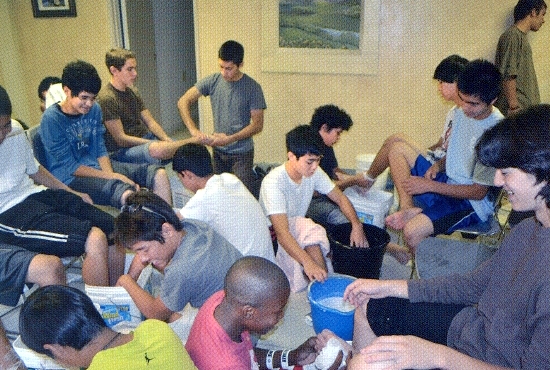
Washing
each other's feet to experience the value of serving
Some students come from a background where they had a very difficult relationship with their parents and their peers, and we have students who don't have a difficult relationship with their parents and who have not lived a rebellious life. Regardless of the circumstance, all those in the second generation who come to the Blessed Teens Academy do so to get an education that is the opposite of the "pop culture" education. As we know, in the pop culture, peers will teach you to not listen to your parents, and the media teaches you to act a certain way. We make effort to do the opposite. We proactively teach the children how to have that relationship with their parents and to find their true, original selves.
Even though children are away from home when they come to the BTA, it doesn't mean they cannot create or deepen a relationship with their parents. We are always encouraging the children to make contact with their parents, to write them, to call them at least once a week; some children call their parents every day.
We educate students about True Parents and the True Children. We have had many opportunities to be with True Children because of all the events in Las Vegas, Lovin' Life, and True Parents' going to Las Vegas. Last year, we went seven times. This was such a blessing for us, because we got to spend time with different members of the True Family, and we got to see True Parents.
Many of us in the second generation may not necessarily have a dysfunctional relationship with our parents, but we may not know the way that Father has taught us, the way of attendance and filial piety. This is very different from, "Oh, hey, dad. Hey, mom. I'm doing fine," or something like that. The relationship might not be bad, but it could also be too casual, lacking much depth or heart. The parents may try to reach out to the children but often the children don't know how to respond, or maybe they just don't know why they should respond. What we teach is "Why" -- why you should love your parents, why you should attend your parents. Because it's loving your parents (or even loving your Abel) that allows them to love you with a parental heart. Everyone is looking for this.
That's what we at BTA are here for, the staff and teachers and the students that end up staying longer. Their purpose is to stay and pass on to others what they have learned. Everything is oriented in that direction. We have kind of a "village" concept. We have two grandmothers living in the house; we have parental figures. We have both first- and second-generation members. My wife and I (from the second generation) are here with our twin babies, and there are other second-generation couples with their babies. If you choose to take advantage of it, it's a real opportunity to experience the four great realms of heart.
There's one point I want to share from my life of faith. I came here as a student. I had a breakthrough in my own life of faith, and
I am realizing every year more deeply what it means to be in our second generation. Who is God to me? Who are True Parents? Like any other relationship, these are ongoing. The more I come to understand about the Principle and about a life of faith and my relationships, the more I come to realize how much I don't know. The deeper in you go, the more you realize how much deeper it is. Hyung-jin nim once said, "If at any time in your life you consider yourself a teacher, that's where you get stuck and put a cap on yourself." We talk about always being a student. I think Father has that same heart.
In this kind of environment, though we might be doing different things individually, everyone has this encompassing purpose, which is to improve themselves, from the parental figures down to the youngest child. I see the staff investing themselves to raise the children, not just like in a school where it's your job, but as if they are caring for their own children or for their own nieces and nephews.
If there are many personalities, it's not going to be easy. We struggle with our own family, which may be three to six people. Sometimes that is so difficult. Just multiply the number. At the same time, I see that as long as everyone's heading in the same direction, people can overcome. They grow so deeply.
In this community, you are being confronted all the time, internally, whether you are a younger student or a parental figure. I have seen the central figures grow so much! The program this year is not the same as the one last year, or the year before. And for each person, one year is not the same as the year before, because it's not a static system. It's living and growing, internally organic. We are always growing, learning from mistakes, improving, and moving forward. It really did have a big impact on my life, and changed the course of my life. I stayed here because I wanted to share what I had experienced with others who are looking for something more as well. Maybe I didn't do anything to deserve it, but I feel that I was blessed and even though it was difficult at times, I wanted to keep investing and be a part of this community.
I feel this is just the beginning. It's like the blueprint for something bigger. I remember True Mother saying, "Why do you take care of the world? Because the world is your family." I caught it intellectually but I never experienced it. My experience has been that going to church we may say hi to the other families, but then we go home and go our separate ways -- maybe we meet at a weekend barbecue -- but that's it.
Here was the first time that I caught what Father was talking about when he said that a child needs a whole village to raise him. In the end, whether you are STF (GPA), BTA, NGA or whatever acronym, we are all doing the same thing, we are all trying to study the Principle, understand God's heart. That's the point of everything we've been doing. For me this place is not what it is but what I see it becoming. That's why I have spent almost eight years of my life here. I feel that this is not so much because of what is immediately going on, or who I am immediately interacting with, but because I believe this place is not so much a program, but more a model community for future generations.
Being an uncle to the children of staff members, feeling so much love for their children, is something I haven't experienced before. I feel it prepares me to become a better father and educator to my children, to their children and to all my nieces and nephews. I believe that the greatest thing I can give to my children is the feeling that the world is their family.
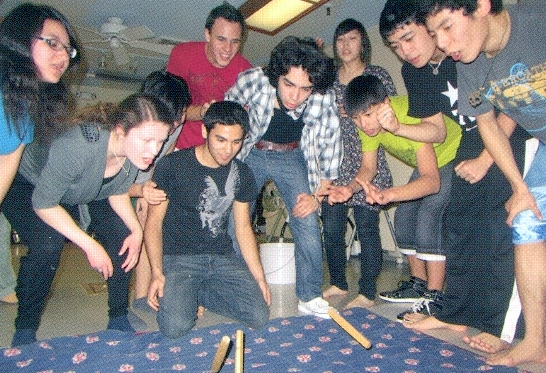
An
intense game of yute on God's Day
From the beginning, we always tell parents that are thinking of sending their children here, "We are not doing this alone; we are doing it together. These are your children, and we are going to raise them together. We are not here to raise them for you."
So they are very much involved with their children. Also we will send a letter to the parents of all the group members to let them know who is taking care of their child. We always keep the parents involved as much as possible.
All of our children are good children. For example, this young lady just had the wrong kind of peer group. Her heart is good, and her desire is to be good. She hit the bottom at the age of fifteen. She listened when she was told "You've got to get your head together."
Our children love and they want to be loved. They do want to understand True Parents, and their faith; they want to know why their parents continue to go this way even though it can often seem so difficult for them.
Even this young lady has become closer to her mom and dad since she discovered her responsibility as their daughter to love them and to attend them. It empowered them and gave them energy -- "Isn't this why we got blessed? This is why we received the blessing, to have this kind of relationship with our children."
This is also why this young man's relationship has improved, because of his relationship with them, validating them as his parents, loving them as his parents, accepting decisions they make. Through that filial heart, parents gain energy.
It's an understatement to say that we know that God wants to be a part of our lives. Our own hearts are not big enough to love anyone. God comes first. No matter how difficult life gets, God comes first. No matter what, all of us want our children to know God and True Parents. We want them to know who they are, and know their relationship to Heaven -- so that they can become the true people that they have the potential to become.